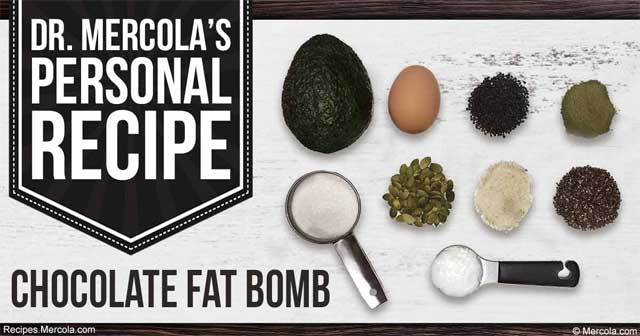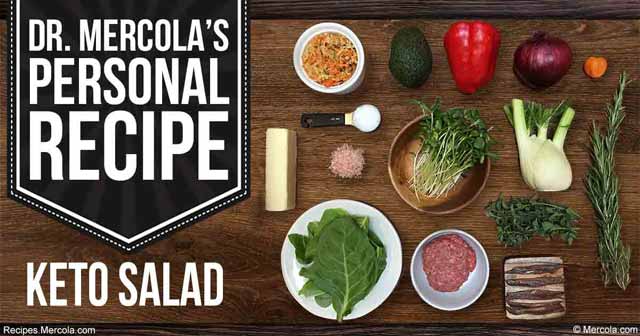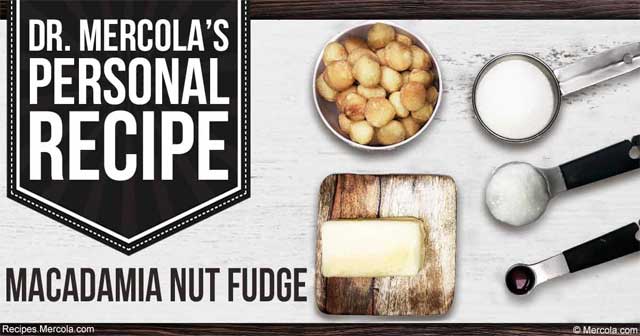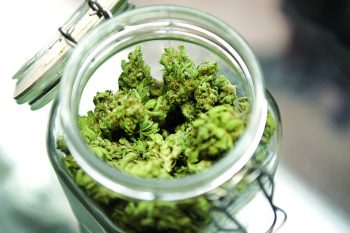Weight loss
If you’re trying to lose weight, then a ketogenic diet is one of the best ways to do it, because it helps access your body fat so that it can be shed. Obese people in particular can benefit from this method. In one study, obese test subjects were given a low-carb ketogenic diet and a low-fat diet. After 24 weeks, researchers noted that the low-carb group lost more weight (9.4 kilograms) compared to the low-fat group (4.8 kilograms).1
Even my own body was able to feel the benefits of following a ketogenic diet. I was able to drop my weight from 180 to 164 pounds, despite eating 2,500 to 3,000 calories per day. Since then, I have increased my consumption to 3,500 to 4,000 calories just to maintain my ideal weight.
Anti-inflammatory
The human body can use sugar and fat as fuel sources. However, the latter is preferred because it is a cleaner, healthier fuel, as it releases far fewer reactive oxygen species (ROS) and secondary free radicals. By eliminating sugar from your daily food consumption, you’re decreasing your risk of developing chronic inflammation throughout your body.
Lowering risk of cancer
One exciting discovery about the ketogenic diet is how it can help prevent cancer. Dominic D’Agostino, Ph.D., an assistant professor at the University of South Florida, recently made headway on how the ketogenic diet can help impact this dreaded disease.
D’Agostino explains that all of your cells (including cancer cells) use glucose as fuel. However, cancer cells do not have metabolic flexibility and cannot adapt to using ketones as energy, which your regular cells can. Once your body enters a state of nutritional ketosis, the cancer cells starve to death.
Also see: New Study Reveals Sugar Doesn’t Just Feed Cancer, It CAUSES Cancer
Increasing muscle mass
Jeff Volek, Ph.D, is a registered dietitian specializing on how a high-fat, low-carb diet can affect health and athletic performance. In one of his books, he states that ketones have a similar structure to branched-chain amino acids that can be useful for building muscle mass. Ketones spare these amino acids, leaving higher levels of them around, which can help promote muscle mass.
Reducing Appetite
Constant hunger can cause you to consume more calories than you can burn, which can eventually lead to weight gain. A ketogenic diet can help you avoid this problem because reducing carbohydrate consumption can reduce hunger symptoms. In one study, participants who were given a low-carbohydrate had reduced appetites, helping them lose weight easier.2
Lowering Insulin Levels
When you consume carbs, they are broken down into sugars in your body. In turn, this causes your blood sugar levels to rise and leads to a spike in your insulin. Over time, you may develop insulin resistance, which can progress to type 2 diabetes.
By altering your diet to a ketogenic approach, you can reduce your risk of developing type 2 diabetes. In a study published in Nutrition & Metabolism, researchers noted that diabetics who ate low-carbohydrate ketogenic diets were able to significantly reduce their dependency on diabetes medication, and may eventually even reverse it.3
Video: Ketogenic Diet 101
Different Types of Ketogenic Diets You Can Try
There are several variations of the ketogenic diet based on specific health needs:4
Standard Ketogenic Diet (SKD)
SKD is the type I typically recommend for most people, because it is very effective. It focuses on high consumption of healthy fats (70 percent of your diet), moderate protein (25 percent) and very little carbohydrates (5 percent).5
Keep in mind that there’s no set limit to the fat, because energy requirements vary from person to person, depending on their daily physical activities.
However, majority of your calories still need to come from fats, and you still need to limit your consumption of carbohydrates and protein for it to become a standard ketogenic diet.6
Targeted Ketogenic Diet (TKD)
TKD is generally geared towards fitness enthusiasts. In this approach, you eat the entirety of your allocated carbs for the day in one meal, 30 to 60 minutes before exercise. The idea here is to use the energy provided by the carbs effectively before it disrupts ketosis.7
If you’re following this approach, I recommend that you eat carbs that are easily digestible with a high glycemic index to avoid upsetting your stomach. Then, when you’re done exercising, increase your intake of protein to help with muscle recovery, then continue consuming your fats afterwards.8
Cyclic Ketogenic Diet (CKD)
Whereas TKD is focused on fitness enthusiasts, CKD is focused more on athletes and bodybuilders. In CKD, you cycle between a normal ketogenic diet, followed by a set number of days of high carb consumption, also known as “carb-loading.”9
The idea here is to take advantage of the carbohydrates to replenish the glycogen lost from your muscles during athletic activity or working out.10
If you’re a high-level athlete or bodybuilder, CKD may be a viable method for you. It usually consists of five days of SKD, followed by two days of carb-loading. During the ketogenic cycle, carb consumption is around 50 grams, but when you get to the carb-loading cycle, the amount jumps to 450 to 600 grams. Again, this method isn’t recommended for most people who do not have a high rate of physical activity.11
High-Protein Ketogenic Diet
This method is a variant of the SKD. In a high-protein diet, you increase the ratio of protein consumption to 10 percent and reduce your healthy fat consumption by 10 percent. In a study involving obese men that tried this method, researchers noted that it helped reduce their hunger and lowered their food intake significantly, resulting in weight loss.12 If you’re overweight or obese, this may help you at first, then you can transition to SKD after you normalize your weight.
Restricted Ketogenic Diet
As mentioned earlier, a ketogenic diet can be an effective weapon against cancer. To do this, you need to be on a restricted ketogenic diet. By restricting your carbohydrate and calorie intake, your body loses glycogen and starts producing ketones that your healthy cells can use as energy. Because cancer cells cannot use these ketones, they starve to death.13
A 2010 study helps back up this claim. A 65-year old woman who was suffering from glioblastoma multiforme (GBM), an aggressive type of brain cancer, was put into a restricted ketogenic diet that started with water fasting and then proceeded to consume 600 calories a day only. After two months, her weight decreased and the ketones in her body elevated.
Furthermore, there was no discernable brain tumor tissue detected using magnetic resonance (MRI) or fluorodeoxyglucose-positron emission tomography (FDG-PET) imaging scans.14
Put Away These Foods Before Going on a Ketogenic Diet
Before coming up with an actual ketogenic diet food list, it’s important to take a look at what you’re eating first and take out anything that’s unhealthy. This means that you have to remove sugars, starches, packaged and processed foods from your diet, because a ketogenic diet focuses on eating real, whole food.
Furthermore, avoid drinking milk because it contains the carbohydrate galactose – drinking just one glass can basically eat up your entire carb allotment for the day. In addition, avoiding milk helps lactose-intolerant people to implement the ketogenic diet. Many other products should be avoided, such as hydrogenated vegetable oils (canola), soy products and sodas. They may be low on carbohydrates, but they are unhealthy and can wreak havoc on your health.
The Ideal Foods to Eat for a Ketogenic Diet
So now that you’ve taken out all the unhealthy food sources, what’s the next step? When it comes to the core of an actual ketogenic diet, remember that you need to consume only a moderate amount of protein, or about one-half gram per pound of lean body mass, each day. In addition, carbohydrates must be minimized and high-quality fats (such as coconut oil and olive oil) increased to serve as your new fuel source.
To ease yourself into a ketogenic diet meal plan, I usually recommend adding C8 medium-chain triglyceride (MCT) oil into your food. It’s typically more expensive than other types of MCT oil, but I prefer it more because it converts into ketones more effectively. You can start with 1 teaspoon per day, then gradually increase your consumption to 2 to 3 tablespoons per day.
If you stomach does not agree with MCT oil, you can try MCT powder, which is easier on your stomach. The table below provides a good overview of other foods rich in high-quality healthy fats:
When building your ketogenic diet meal plan, it’s important to stick to green leafy vegetables because they are rich in fiber, antioxidants and various nutrients. Your best choices include broccoli, spinach, parsley, Brussels sprouts and zucchini.
While fruits are generally healthy for you, majority of them should be are avoided in a ketogenic diet because of their high amounts of sugar. However, certain berries are safe to eat in moderate quantities, such as blackberry, blueberry and cranberry, because they are rich in antioxidants that can support your health.
As for beverages, there are several you can choose from. The most important is water, but you may also drink organic black coffee (without any sweeteners or milk), which is rich in antioxidants. Coconut milk can be consumed as well, as well as herbal teas because they are rich in various antioxidants and nutrients. If you want a more extensive list, Paleo Flourish Magazine has recommendations that encompass various food groups.15
Ketogenic Recipes You Can Try
It may look like there are plenty of foods not allowed when following a ketogenic diet, but there are actually many recipes that you can cook that adhere to this method. Here are three ketogenic recipes that I personally use in my daily routine:



Who Should Not Be on a Ketogenic Diet?
Based on published studies, a ketogenic diet can be beneficial for optimizing your health. However, not everyone can follow this eating plan due to certain factors. If you fall within any of the following categories, I recommend that you do not push through with a ketogenic diet for safety reasons:16, 17
| Pregnant
During pregnancy, your body undergoes many changes that require nutrients from various sources. Therefore, severely restricting yourself from healthy carb sources may negatively impact your baby’s health.18 |
Breastfeeding
Breastfeeding women should avoid a ketogenic diet throughout the child’s breastfeeding phase. That’s because women need oxaloacetate, a compound essential for creating lactose for breastmilk, which is essential for their baby’s growth. |
| An Athlete Who’s About to Start a New Season
Athletes can greatly benefit from the energy produced by ketones, but it takes around four to six weeks for your body to achieve ketosis. During this time, your body has not yet adapted to using fat as an energy source, which may impede your performance in upcoming athletic events. If you wish to take advantage of the ketogenic diet, give your body time to adapt by planning ahead during the off-season. |
Had a Gallbladder Removed
Your gallbladder collects and concentrates bile, allowing your digestive tract to absorb dietary fat properly. Without it, dietary fat won’t be absorbed as much, which can lead to nutrient deficiencies, since a ketogenic diet largely relies on fat for nutrients. The solution is quite simple. Just be sure to consume two supplements with every meal that you have fat. Ox bile and lipase. The ox bile will help emulsify the fats so you can absorb them and replace the bile that is normally secreted by your gallbladder. The lipase is an enzyme that will help digest the fat. |
| Has a History of Kidney Stones
If you have developed kidney stones before, a ketogenic diet may increase your chances of getting them again. That’s because ketones are naturally acidic, which increases the production of uric acid and the formation of stones. On the other hand, kidney stones may be prevented while on a ketogenic diet if you increase your consumption of potassium from leafy greens and other high-fat foods such as avocado. Staying hydrated throughout the day also helps lower your risk of developing stones. |
Your Body Is Still Growing
In one study, epileptic children experienced a reduction in symptoms and improved cognitive performance when a ketogenic diet was introduced.19 However, this may have a negative effect on the growth of their bodies in the long run, according to a study published in the journal Developmental Medicine & Child Neurology.20 Researchers believe that a ketogenic diet reduces the production of insulin-like growth factor 1 (IGFT-1), a hormone essential in the development of the bones and the muscles of kids and teenagers. If your child absolutely needs to be on a ketogenic diet, consult with a doctor first to discuss any potential growth issues. |
| Naturally Thin
Naturally thin people with a body mass index (BMI) of 20 or less should avoid a ketogenic diet because it may induce further weight loss, which can be detrimental to your overall health. |
Have Rare Metabolic Disorders
Disorders such as Gaucher’s, Tay-Sachs, Niemann-Pick and Fabry’s disease can interfere with fat metabolism, thus affecting energy production. If you have any of the aforementioned disorders, a ketogenic diet is not recommended as it relies largely on fat for energy production.21 |
| Have Anorexia
Anorexics may suffer from rapid starvation if they follow a ketogenic diet, because they already limit their calorie consumption and have an extreme fear of eating fat, which a ketogenic diet has lots of. If they embark on a ketogenic eating plan, they may also suffer from low energy, because a ketogenic diet relies on dietary fat as the main source of fuel. However, their overall wellbeing may benefit from ketones through careful medical and psychiatric supervision. |
Pancreatic Insufficiency
Pancreatic insufficiency is a condition where your pancreas does not produce enough enzymes to help break down and absorb nutrients in your digestive tract. If you have an enzyme deficiency, I suggest having it treated first before embarking on a ketogenic diet, because your digestive system will have a hard time absorbing dietary fats. |
The Side Effects of a Ketogenic Diet
Starting a ketogenic diet can help optimize your health tremendously in many ways. But like any major dietary changes, it can have several undesirable (but not alarming) side effects, such as:
|
Bad Breath: Once you start on a ketogenic diet, you may notice that your breath will have an undesirable odor due to the increased acetone levels in your body. Acetone is a ketone produced during ketosis, which is expelled in your urine and partly your breath. On a positive note, detecting acetone in your breath is a good indicator that your ketogenic diet is working.22 You can brush your teeth and/or rinse your mouth with coconut oil to help remove the bad breath. |
Short-Term Fatigue: You may begin to feel fatigue at the start of a ketogenic diet. It’s actually one of the main reasons why many people choose not to continue with this approach long before they can enjoy the benefits.23 The reason why you get tired at the start is your body is adapting from using carbohydrates for energy to healthy fats. The transition doesn’t happen overnight, and it may take you anywhere between seven to 30 days before your body achieves full ketosis.24 |
|
Frequent Urination: During the first few days of implementing a ketogenic diet, you may notice that you’re using the bathroom more often. That’s because your body is dumping the glycogen in your liver and muscles as urine. Furthermore, as the insulin level in your blood begins to drop, excess sodium is expelled in the form of urine as well.25 |
Digestive Problems: A huge shift into any dieting method can increase your risk of digestive problems, and the ketogenic diet is no exception. Constipation is commonly reported among those who are starting out on a ketogenic diet, but it may disappear in a few weeks once your body gets used to the healthier food you’re eating.26 |
|
Sugar Cravings: You may develop intense sugar cravings as your body switches from sugar to fat for fuel. However, I encourage you not to give in to temptation. You can practice various relaxation method such as the Emotional Freedom Techniques or yoga to take your mind away from sugary foods.27 |
Hair Loss: You may notice that more strands of hair getting stuck on your brush during the first few days of your ketogenic diet. Don’t worry because this is not a big cause of concern, since hair loss can result from any major dietary changes in general. It will stop once your body achieves ketosis.28 |
Going into nutritional ketosis by following a ketogenic diet is one of the most radical but highly beneficial lifestyle changes you can make to improve your health. As with most dietary changes, always remember to listen to your body. If you feel any side effects other than the ones listed above, then necessary adjustments may be needed to your food intake.
Frequently Asked Questions About the Ketogenic Diet
Q: How do I go into nutritional ketosis?
A: To enter into a state of nutritional ketosis, take a look at what you’re currently eating and remove any unhealthy items such as sugary drinks and processed foods. The next step is to consume whole, organic foods that are high in healthy fats, has moderate protein and only minimal carbohydrates.
Q: How long does it take to get into ketosis?
A: Each person reacts differently to a ketogenic diet. You may experience a few side effects in the first seven to 30 days, such as constipation, fatigue and urination. But once your body normalizes, you will start feeling the benefits.
Q: How many carbs can I consume to be in a state of ketosis?
A: It’s generally recommended that only 5 percent of your daily diet is allocated to carbohydrates because if you consume more than that, your body gets thrown off ketosis. However, this is only for SKD, or the standard ketogenic diet. If you’re an athlete or a bodybuilder, you can consume more carbs without affecting ketosis by following a targeted ketogenic diet (TKD) or a cyclic ketogenic diet (CKD).
Q: How long does it take before ketosis shows results?
A: The results of ketosis can be felt as early as the first week when your body begins to dump water and carbohydrates, but the weight loss will only be minor.29 As time goes on, your body will begin to consistently shed excess fat, provided you stick to your ketogenic program.30
Fat for Fuel: A Radical Approach to Achieving a Healthier You
If you’ve been experiencing weight problems or dealing with other health issues for a long time and you’re struggling to become healthier, you’ve come to the right place. In my new book, “Fat for Fuel: A Revolutionary Diet to Combat Cancer, Boost Brain Power, and Increase Your Energy“, I will show you many helpful strategies that can boost your health, such as:
And a whole lot more, all designed to help you experience positive changes in your body that will last a lifetime.
- 1 Ann Intern Med. 2004;140(10):769-777
- 2 Obesity, “The Effects of a Low-Carbohydrate Ketogenic Diet and a Low-Fat Diet on Mood, Hunger, and Other Self-Reported Symptoms” January 2007
- 3 Nutrition & Metabolism, 2008; 5: 36.
- 4, 7, 8, 9, 11, 13 KetoDiet Blog, “Types of Ketogenic Diets (SKD, TKD & CKD) and the KetoDiet Approach” November 5, 2013
- 5 Authority Nutrition, “The Ketogenic Diet 101: A Detailed Beginner’s Guide”
- 6, 10 Diabetes.co.uk, “Types of Ketogenic Diet”
- 12 American Journal of Clinical Nutrition, 2008 Jan;87(1):44-55.
- 14 Nutrition & Metabolism, 2010; 7: 33.
- 15 Paleo Flourish Magazine, “Ketogenic Diet Food List — What Are Keto Foods?”
- 16 Mark’s Daily Apple, “Is Keto for Everyone? — Cautions, Caveats and Contraindications” June 21, 2017
- 17 Diagnosis: Diet, “Is the Ketogenic Diet Safe for Everyone?”
- 18 Pregnancy, “Is Ketosis Dangerous During Pregnancy?” February 10, 2014
- 19 Canadian Family Physician, 2010 June;56(6):540-542
- 20 Developmental Medicine & Child Neurology, 2014 Sep;56(9):898-904
- 21 MSD Manual, “Disorders of Lipid Metabolism”
- 22 American Journal of Clinical Nutrition, “Breath Acetone Is a Reliable Indicator of Ketosis in Adults Consuming Ketogenic Meals” July 2002
- 23, 24, 30 Authority Nutrition, “10 Signs and Symptoms That You’re in Ketosis”
- 25, 27 Ketogenic Diet Resource, “Low Carb Diet Side Effects”
- 26 The Journal of Pediatrics, “Ten-Year Single-Center Experience of the Ketogenic Diet: Factors Influencing Efficacy, Tolerability and Compliance” April
- 28 Diet Doctor, “Can Low-Carb Diets Result in Hair Loss?” October 21, 2015
- 29 American Journal of Clinical Nutrition, “Glycogen Storage: Illusions of Easy Weight Loss, Excessive Weight Gain and Distortions in Estimates of Body C
Recommended articles by Dr. Joseph Mercola:
- Anxiety Overtakes Depression as No. 1 Mental Health Problem
- How LED Lighting May Compromise Your Health
- Magic Mushrooms May Hold Key to Long-Term Relief from Anxiety and Depression
- Medical Errors: Still the Third Leading Cause of Death
- Photobiology: How Therapeutic Use of Full-Spectrum Light Can Improve Your Health
- Scientific Links Between Processed Foods and Depression
- How Sugar Harms Your Brain Health and Drives Alzheimer’s Epidemic
- The Health Benefits of Intermittent Fasting
- Can a Hug a Day Keep Infection Away?
- The Harmful Effects of Electromagnetic Fields Explained
- The Magic Healing Power of Mushrooms
- 13 Mind-Body Techniques That Can Help Ease Pain and Depression
- Maternal Fluoride Exposure During Pregnancy Correlates to Lower IQ in Their Children
About the author:
 Born and raised in the inner city of Chicago, IL, Dr. Joseph Mercola is an osteopathic physician trained in both traditional and natural medicine. Board-certified in family medicine, Dr. Mercola served as the chairman of the family medicine department at St. Alexius Medical Center for five years, and in 2012 was granted fellowship status by the American College of Nutrition (ACN).
Born and raised in the inner city of Chicago, IL, Dr. Joseph Mercola is an osteopathic physician trained in both traditional and natural medicine. Board-certified in family medicine, Dr. Mercola served as the chairman of the family medicine department at St. Alexius Medical Center for five years, and in 2012 was granted fellowship status by the American College of Nutrition (ACN).
While in practice in the late 80s, Dr. Mercola realized the drugs he was prescribing to chronically ill patients were not working. By the early 90s, he began exploring the world of natural medicine, and soon changed the way he practiced medicine.
In 1997 Dr. Mercola founded Mercola.com, which is now routinely among the top 10 health sites on the internet. His passion is to transform the traditional medical paradigm in the United States. “The existing medical establishment is responsible for killing and permanently injuring millions of Americans… You want practical health solutions without the hype, and that’s what I offer.”
Visit Mercola.com for more information, or read Dr. Mercola’s full bio and resumé here.
Source Article from https://wakeup-world.com/2017/12/30/beginners-guide-ketogenic-diet-effective-way-optimize-your-health/
Related posts:
Views: 0
 RSS Feed
RSS Feed

















 December 30th, 2017
December 30th, 2017  Awake Goy
Awake Goy 




 Posted in
Posted in  Tags:
Tags: 
















